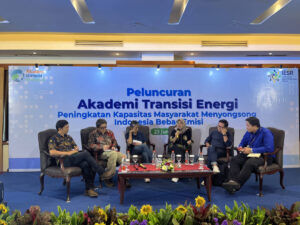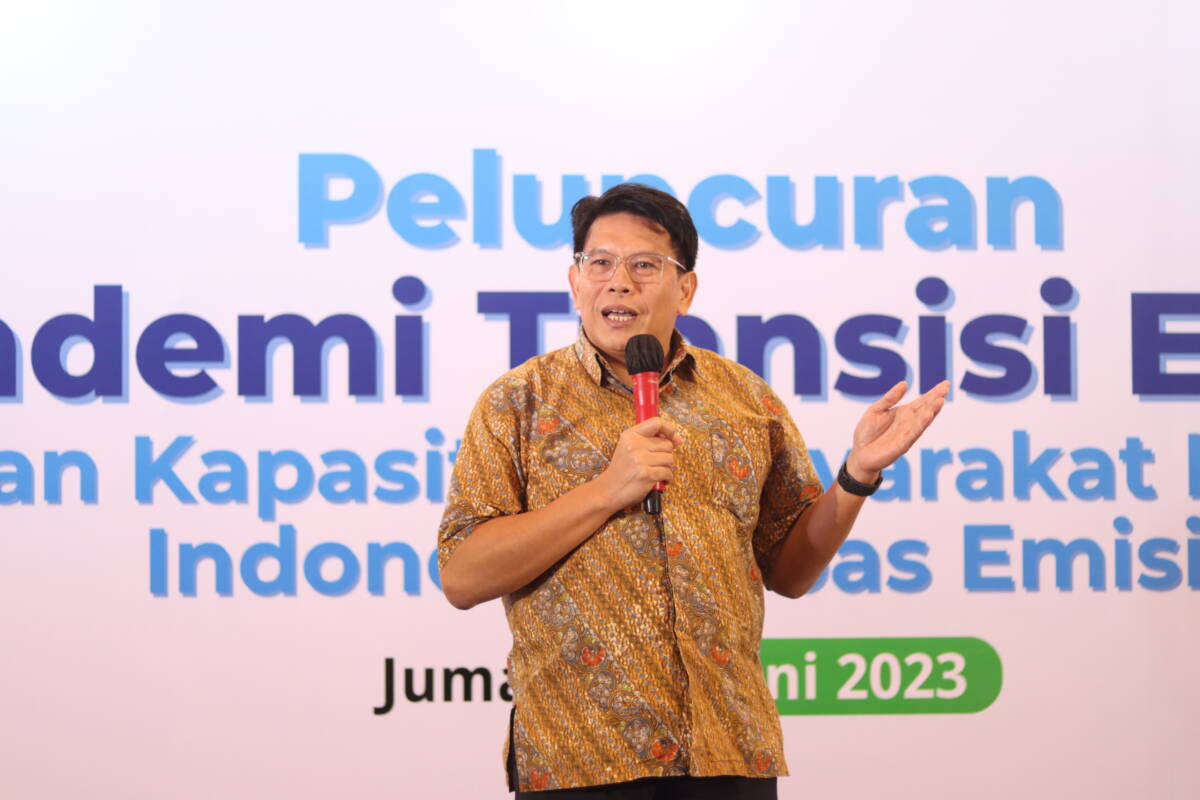Jakarta, June 23, 2023 – The Institute for Essential Services Reform (IESR) encourages community capacity building towards an emission-free Indonesia by launching the Energy Transition Academy platform, accessed via the academy.transisienergi.id website. The platform serves as a forum for learning about energy transition and climate change issues connecting with the growing popularity and frequent use of the phrase “energy transition” in public spaces.
The Executive Director of IESR, Fabby Tumiwa explained that the Government of Indonesia had launched a gradual energy transition and would achieve net zero emission (NZE) in 2060 or earlier. Howeverd, based on the IESR study entitled “Deep decarbonization of Indonesia’s energy system: A pathway to zero emissions by 2050” shows that technologically and economically, Indonesia’s energy sector can achieve zero carbon emissions by 2050. The transformation of energy supply and utilization across all energy sectors is crucial to attaining NZE.
“By achieving NZE by2050, Indonesia can generate 3.2 million new jobs in the renewable energy sector. This presents opportunities for economic growth and job growth. Therefore, there is a need to build new capacities, expertise, and skills, considering that the energy transition must bring social and economic benefits. Reflecting on this, the energy transition academy can serve as a means for the community to participate in the energy transition by enhancing insight and capacities,” explained Fabby Tumiwa.

Irwan Sarifudin, Coordinator of the Clean Energy Hub, IESR, highlighted that through the Energy Transition Academy platform, it is expected that the general public can apply knowledge about energy transition in their daily work. Particularly for Non-Governmental Organizations, by gaining knowledge about the energy transition, can enable them to initiate renewable energy projects, without solely relying on assistance from the central government.
“The Energy Transition Academy platform offers several features that facilitate learning, distinguishing it from other platforms, such as Synchronous and Asynchronous, Continue Later, As Fast as Your Understanding, Ask Anywhere, Data Sources & Reference, and Tutor Guidance,” said Irwan.
Raditya Wiranegara, IESR Senior Researcher, mentioned the Energy Transition Academy collaborated with various well-known universities and institutions in three phases of module development. In the first phase of the Energy Transition Academy partnered with ITB, UNS, and ATW Solar, the second phase was collaborated with UI, Swiss German University, ITS, Mongabay, and Tempo, and the third phase was collaborated with UGM, Mataram University, PEC, Ministry of Energy and Mineral Resources and so on.
“There are several energy transition academy classes with guaranteed quality, including the basics of the energy transition, an introduction to the energy transition roadmap in Indonesia, and rooftop solar power training,” said Raditya.
The launch of the Energy Transition Academy has received positive feedback from various sectors. Khoiria Oktaviani, GERIYA Program Manager at the Ministry of Energy and Mineral Resources, explained that the existence of the Energy Transition Academy is expected to provide insight and knowledge related to the energy transition.
“We think there is a gap where college students primarily acquire theoretical knowledge, so after graduation, they often feel a lack of practical experiences in the field. The limitation of GERILYA lies in the selection, which sometimes results in an even distribution of participants across Indonesia,” said Khoiria.
Irvan S. Kartawiria, Deputy Chancellor of the Swiss German University (SGU), emphasized that the Z and alpha generations are highly concerned about the social impact of the work to be carried out, how work impacts others, and environmental sustainability. For this reason, several universities (including SGU, red) prepare their students to meet these needs.
On the other hand, Efri Ritonga, a TEMPO journalist, stated that this energy transition is highly complex process, not only the change in the energy system from fossil-based energy to clean energy, but is closely related to other sectors,such ass of energy, electricity, battery-based transportation.
“From the journalist’s point of view, it is not easy to understand the issue of the energy transition. The easiest things that directly affect people, such as home energy consumption, electric vehicles, the issue of coal-fired power plants (CFPP) pollution, our need is to understand issues directly grounded in society,” said Efri.
Hadi Priyanto, Climate & Energy Campaigner at Greenpeace, assessed that the government’s Just Energy Transition Partnership (JETP) commitment is increasingly focused on the energy transition. However, to mainstream the energy transition to society, broader and more massive awareness and more stable regulations from the government are needed.
Muhammad Arman, Legal Consultant Advocate & AMAN Mediator, said the practice of clean energy has long been carried out with local wisdom by indigenous peoples. For example, several villages have implemented energy independence in Sorong, West Papua.
“The principle of the energy transition is inclusive, equitable, and fair. Do not let the energy transition create injustice and lots of piracy. For that, we need an Indigenous Peoples Law to ensure that Indigenous peoples protect the environment,” said Arman.
The Energy Transition Academy launch event was held on Friday (23/6/2023) with two sessions, namely the launch and workshop of the Energy Transition Academy platform. Several students and the general public participated in trying out the Energy Transition Academy platform in the workshop.

